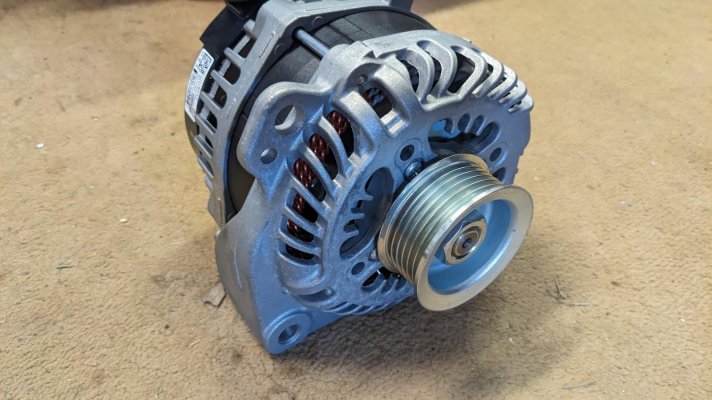Ok guys I did some more testing today, and I'm still stumped.
* I sprayed water on the alternator pulley and belt. It didnt make any difference to the noise, making me less suspicious of the belt.
* Then I connected jumper leads (both + and -) direct from the alternator to the battery. No difference. Note: I forgot to disconnect the alternator wire though...so this may be a false test.

* Then i plugged in my OBD2 scanner, and checked the BCM for charging data. It appears to be pulling about 60A:

I wanted to double check this with an amp clamp, but unfortunately I only have an AC one, so it didnt work.
* Then I checked for tensioner markings. I couldn't find anything definitive, so here are some pictures:


* Finally I Ohmed all of the cables and routes that power would take:
Positive Wires
+ Wire that goes from alternator to fusible link = 1.8ohm
+ One side of fusible link fuse to other side of fuse = 3.1ohm
+ Positive battery post to battery side of fusible link = 3.4ohm
+ Alternator post to positive battery post = 10.2ohm
Negative Wires
- Alternator body to chassis post on firewall = 7ohm
- Engine block to random bolt on body = 5ohm
- Battery terminal to engine block = 4ohm
* I sprayed water on the alternator pulley and belt. It didnt make any difference to the noise, making me less suspicious of the belt.
* Then I connected jumper leads (both + and -) direct from the alternator to the battery. No difference. Note: I forgot to disconnect the alternator wire though...so this may be a false test.
* Then i plugged in my OBD2 scanner, and checked the BCM for charging data. It appears to be pulling about 60A:
I wanted to double check this with an amp clamp, but unfortunately I only have an AC one, so it didnt work.
* Then I checked for tensioner markings. I couldn't find anything definitive, so here are some pictures:
* Finally I Ohmed all of the cables and routes that power would take:
Positive Wires
+ Wire that goes from alternator to fusible link = 1.8ohm
+ One side of fusible link fuse to other side of fuse = 3.1ohm
+ Positive battery post to battery side of fusible link = 3.4ohm
+ Alternator post to positive battery post = 10.2ohm
Negative Wires
- Alternator body to chassis post on firewall = 7ohm
- Engine block to random bolt on body = 5ohm
- Battery terminal to engine block = 4ohm

